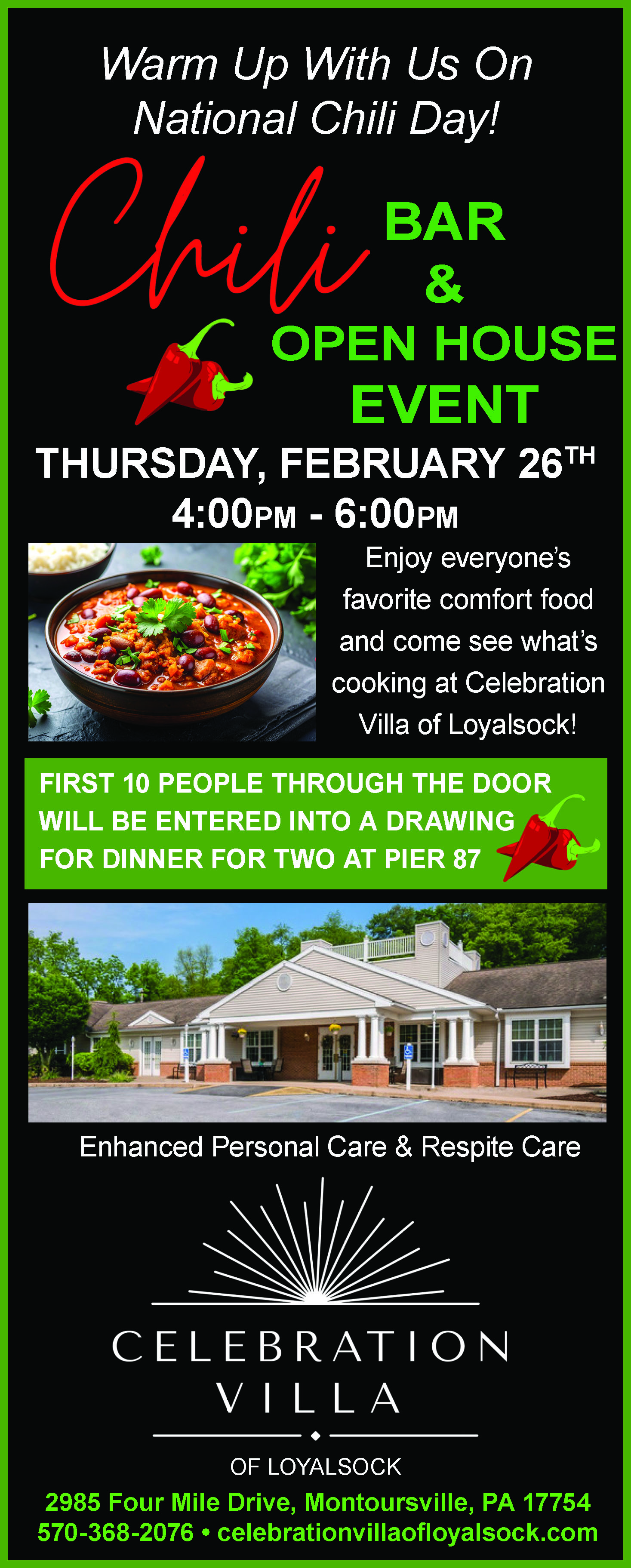The plight of the homeless in Lycoming County was brought into a stark and tragic spotlight two weeks ago when the body of a homeless man was found along the River Walk. Precise numbers for the amount of homelessness here is hard to obtain. Numerous attempts are made to quantify the amount, but those who are homeless are reluctant to be identified for various reasons. The seemingly bleak situation of homelessness has a bright spot, though; several social service agencies are trying to make things better for them. These include Family Promise of Lycoming County, the American Rescue Workers, and the Northcentral PA YWCA’s Liberty House. We will detail for you some of what these groups are doing.
“We are a homeless family shelter. Our focus is holistic in the sense that every staff member here has recovered from homelessness and we understand the depth of the trauma on ourselves, but especially our children,” Jenny Hull, director of Family Promise of Lycoming County, as she detailed for Webb Weekly what Family Promise does. “At Family Promise, we look at each member of the family and work with them to create and accomplish goals that will not only get them back in housing but break the cycle of homelessness. We have a three-fold approach to accomplish this.
“The first is our homeless prevention program called Promising Futures. Promising Futures was created from staff experience and the observation that keeping someone housed is not only more cost-effective but can actually stop trauma within the family before it begins. Children who become homeless are less likely to do well in school, graduate high school or attend college. Those same children are more likely to experience health issues such as asthma and repeated illnesses, experience hunger, and be subject to abuse at the hands of those who the families may stay with while waiting to get into a home of their own. The cost to shelter a family of four is roughly $3,000 a month, while the average amount of rent that keeps a family in a home is about $2,000. To say that the benefits of preventing homelessness are a great investment is an understatement. In 2019 we served over 6,000 people in our Prevention Programs, including our food pantry and free clothing and coat programs. Those receiving rental assistance are successful in staying in their homes 98 percent of the time.”
For those families that do find they are without homes, the shelter provides a safe and educational environment for families to heal. Each family is welcome to stay at Family Promise for 4-6 months while gaining employment, health care, and participation in educational opportunities such as budgeting, Keys to Good Tenancy, life skills classes, job searching techniques, and intensive case management, which allows for individuals to address the root issues of homelessness in their lives. Families that move through the shelter program are successful 93 percent of the time.
“The third area we provide assistance is Stabilization. Family Promise has four transitional housing units that we make available to those families that have been through our shelter program and could use some extra time to continue to work on root causes of homelessness. The goal is to move from our Promise House program to a home they own. We have been very successful with this program seeing four out of five families move into their own homes and save over $10,000 each toward the down payment. The Stabilization portion of our program also extends to graduates of our shelter who move into apartments. We will assist and continue with case management and other programs for up to two years.
“Family Promise can accomplish all of this with the partnership of local churches. Volunteers provide evening meals, fellowship, and other assistance as needed. We have had volunteers do everything from teaching a mom to read after being the first woman in her family to learn to do so in three generations to drive out of state to obtain copies of birth certificates. Our volunteers are the heart of our program. We don’t take government funds for any essential programming or salaries. 100 percent of every dollar donated goes to direct service with our families. At Family Promise, we know that the ability to recover from homelessness is possible with support, time, and accountability families can and do recover.”
Valerie Fessler, Director of Development and Community Engagement for the local chapter of the American Rescue Workers, detailed their homeless services.
To prevent homelessness, the American Rescue Workers’ Social Services Center assists those facing a potential homelessness crisis by paying rental and utility bills for those in need. The Harry Plankenhorn Foundation provided funding for these programs, PHARE funding awarded through Lycoming County, The Lycoming County Veterans Transition Center, Federal Housing Assistance Program Funding, and Lycoming County United Way. This funding is paid directly to landlords and utility companies and is used to prevent individuals from becoming homeless.
According to Fessler, at the beginning of the COVID-19 pandemic, an eviction moratorium provided relief to many renters who were facing eviction due to lack of payment. This moratorium was intended to provide help to those who saw a loss of wages due to the pandemic. They are now seeing that many families who were not impacted by the pandemic also chose not to pay rent during this moratorium. At this time, the American Rescue Workers sees a high demand for back rental payments from both those impacted by the pandemic and those who were not directly impacted by a loss of wages. It is their ministry’s mission to prevent a homelessness crisis while also being good stewards of the donations they receive from various funding sources. On average, in 2019, the ARW Social Services Center turned away 64 individuals per month who we were unable to help with assistance due to limited funding, and we expect to be faced with higher need in 2021.
“One of the things that we are now learning about the eviction moratorium is that while landlords are not permitted to evict tenants due to back rent, they are, however, permitted to not renew lease agreements,” Fessler said. “Landlords are still responsible for paying their mortgages, and many have been forced to not renew leases with tenants who are unable to pay. This is one of the contributing factors to ARW seeing a higher number of individuals and families seeking shelter in one of ARW’s three shelter programs.”
When an individual or family becomes homeless, they seek shelter in one of ARW’s three shelter programs:
Emergency transitional shelter: a shelter for men who need short term emergency shelter. This shelter houses six men at a time. The residents are provided with overnight accommodations, meals, laundry and shower facilities, personal care items, and case management to help them regain self-sufficiency.
Family emergency shelter: Saving Grace Shelter is a family emergency shelter with 24 beds where men, women, and children can stay together as a family. Individuals and families are provided with overnight accommodations, meals, laundry and shower facilities, personal care items, and case management to help them regain self-sufficiency.
Men’s long-term work rehabilitation shelter (Fresh Start Program): a 39 bed, 12-18 month program for men with significant barriers to self-sufficiency. In this program, men are provided with overnight accommodations, meals, laundry, shower facilities, personal care items, and case management to help them gain self-sufficiency. As part of the program, the tenants work at American Rescue Workers to gain the soft skills necessary to re-enter the workforce. They are mandated to attend personal development classes and work closely with Careerlink and other community resources for success.
Fessler said COVID-19 has caused the need for shelter to fluctuate. Initially, the need for shelter remained consistent, with beds full in all shelters. During the summer months, shelters often see lower census numbers due to the warmer weather. During the summer of 2020, many shelter residents also became recipients of COVID-19 unemployment funding, giving them the financial means necessary to seek their own housing. Now in 2021, they are starting to see those whose lump unemployment funding has run out or who were not ready to live on their own return to the shelters.
“Currently, the average shelter stay is longer than usual — often at no fault of our tenants. Many landlords are not accepting new tenants due to the eviction moratorium, and many tenants are truly unable to find work due to the pandemic. This is causing a shelter waiting list.”
In order to keep staff and shelter tenants safe, all new shelter tenants are required to be tested for COVID-19. River Valley Health and Dental has partnered with ARW to provide this service to those seeking shelter. A rapid test is performed immediately to determine shelter admission. If someone seeking shelter tests positive for COVID-19, ARW has partnered with River Valley Health and Dental and STEP Inc. to provide safe, quarantined housing for the individual in need.
“As the COVID-19 pandemic continues to evolve, so do the resources available to organizations like ours who are standing in the gap for those who need us the most,” Fessler said. “We have been blessed with the help of amazing community partners who are all working to solve the homelessness and hunger crisis while also responding to a pandemic.”
Jernae Drummond, the Northcentral PA YWCA’s Housing Services Supervisor, describes her agency’s role in the homelessness plight.
“Homelessness in Lycoming County looks much different than what one may see in larger cities or in Hollywood entertainment. However, it is still very prevalent right where we live,” Drummond said. “In our community, people who are homeless are seeking shelter at local nonprofits such as the YWCA Northcentral PA’s Liberty House. Within the walls of our building, we currently house several women and their children who are seeking safety, stability, and refuge from a lifestyle that has been plagued with Substance Abuse Disorders, trauma, homelessness, and in some cases, mental health illness. We, at Liberty House, understand suitable Housing is at the core of self-sufficiency and overall well- being and we are honored to provide just that.”
The YWCA has partnered with Pennsylvania’s 211 Coordinated Entry System, which serves as a resource hub for people experiencing homelessness and other insecurities related to food, shelter, or clothing. An assessment completed over the phone by calling 211 connects us with those who are suffering from chronic homelessness and battling addiction in a prioritized way. The most vulnerable or at-risk individuals being the first pick for services.
“Upon intake into the Liberty House program, each client is paired up with a Case Manager who specializes in creating an individualized service plan and referrals to local resources,” Drummond said. “Our primary goal is to aid the client as they travel the road towards self-sufficiency, providing them with support, referrals, life skills tools, dignity, and a safe place to live with the hope these efforts will put an end to homelessness. Most recently, we have added our Rapid Re-housing project funded by the Department of Housing and Urban Development (HUD); this program allows us to provide financial assistance for housing and case management to individuals who are fleeing or homeless because of domestic violence.”




Leave a Comment
Your email address will not be published. Required fields are marked with *